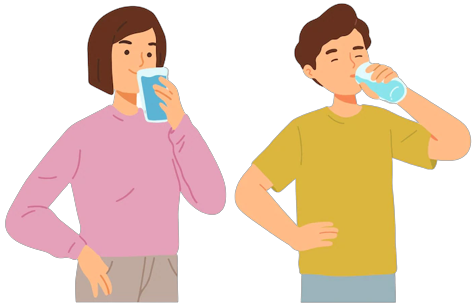Patient: Male, 45 years old
Date: 12th April 2022, first consultation
Chief complaint: Painful urination (Dysuria) for 1 year

A male patient entered the consultation room on this particular day. He inquired anxiously and I could sense he was embarrassed. I asked him to describe the issue he wanted to consult first and told him that if he found it difficult to do so, I would set up a meeting with a male doctor, it was until then that he felt at ease. As it turned out, he had scheduled a visit because he was uncomfortable urinating.
The patient has always enjoyed fried and spicy foods, and one day last year, as usual, he inished lunch and discovered that he had burning pain when he urinated. He was initially unconcerned, and it was not until the issue persisted for a whole month that he realized something wasn’t right with his body, prompting him to visit the hospital for a check-up. No evident abnormalities were found during the screening for kidney stones and urinary issues. His urination issues intermittently returned after taking medication for almost a year, so he came to see if Chinese medicine could help.
After gaining an understanding of the patient’s eating habits, I routinely asked the patient about his other daily habits and discovered that, aside from his spicy and greasy diet, his usual living habits were quite regular; he would go to bed regularly every night and would take time to go to the nearby park to exercise once a week. I informed the patient after analysing his tongue and pulse that damp heat was the root of his abnormal urination, and that if he cut back on eating spicy food and used Chinese medicine to reduce heat and eliminate dampness, his urine issue would improve.
Date: 19th April 2022. Second consultation
A week later, when the patient who had finished taking the medication returned for a follow-up appointment, he noted that while he had noticed a reduction in his frequency of urination and the pain that accompanied it, the burning sensation was still present. I modified the patient’s Chinese medicine and advised him to monitor his diet, stay away from spicy foods, and return after taking the medication.
Date: 26th April 2022. Third consultation
The patient returned to let me know that after taking the medication, he was unable to resist eating a small bit of fried bananas and the burning in his urine returned, so he came back for another consultation. I formulated an appropriate Chinese medicine based on his symptoms at the time, and advised him to avoid eating fried and spicy foods while taking the medication to prevent the disease from recurring.
Date: 26th July 2022. Fourth visit
After three months, the patient returned to see me to say that his urination problem had stopped since taking the last medication, and that today he had come to check his pulse to see if the damp-heat in his body had subsided. I informed the patient that, although his damp-heat had improved, he still needed to be mindful of his diet and limit the intake of spicy and stimulating foods. As long as he followed these instructions, he didn’t need to worry too much about the recurrence of the illness, and should only return if he was experiencing symptoms.
Pathological analysis

Urinary tract infection, classified as “lin zheng” in Chinese medicine, is caused primarily by factors such as poor eating habits, overwork, and mood swings that affect the qi transformation (movement and change of qi) function of the kidneys and bladder, resulting in abnormal bladder storage and excretion of urine, followed by discomfort such as poor urination, increased frequency of urination, urgency when urinating, and even pain when urinating.
Due to the patient’s long-standing preference for spicy and fried foods, accumulation over time results in abnormal digestion and absorption by the spleen and stomach, and production of dampness (increased viscous fluid in the body). As dampness cannot be eliminated from the body, it develops and stagnates, leading to internal heat, when dampness and heat combined to form damp-heat, which then invades the bladder and causes urination problems, including burning and pain when urinating.
Daily preventions
1. Never hold your urination

Urination is one of the ways the human body detoxifies, and holding urine for an extended period of time not only causes toxins to accumulate in the body due to delayed elimination; it can also create difficulty urinating due to a significant amount of pee remaining in the bladder. Hence, developing healthy and good urination habits, going to the toilet on time whenever you feel the desire to urinate, and expelling your urine as quickly as possible on unavoidable instances where you have to hold your urine will effectively prevent urinary tract infection.
2. Increase water intake

Most people who suffer urinary tract infections have difficulty peeing because they do not drink enough water. Consuming more water to increase urine production will assist the body eliminate toxins, particularly dampness and heat, and can also help flush the urinary tract, thus preventing urinary tract infection.
3. Dietary interventions
Patients suffering from damp-heat should limit their intake of cold, sticky, and difficult-to-digest food such as sticky rice, cheese, and banana.

Include more fragrant foods in your daily diet, such as coriander, bean sprouts, white hyacinth bean, and wax gourd, to assist eliminate dampness from the body.

此文章还有以下语言版本:
![]() 简体中文 (Chinese (Simplified))
简体中文 (Chinese (Simplified)) ![]() Melayu (Malay)
Melayu (Malay)



